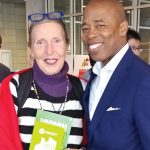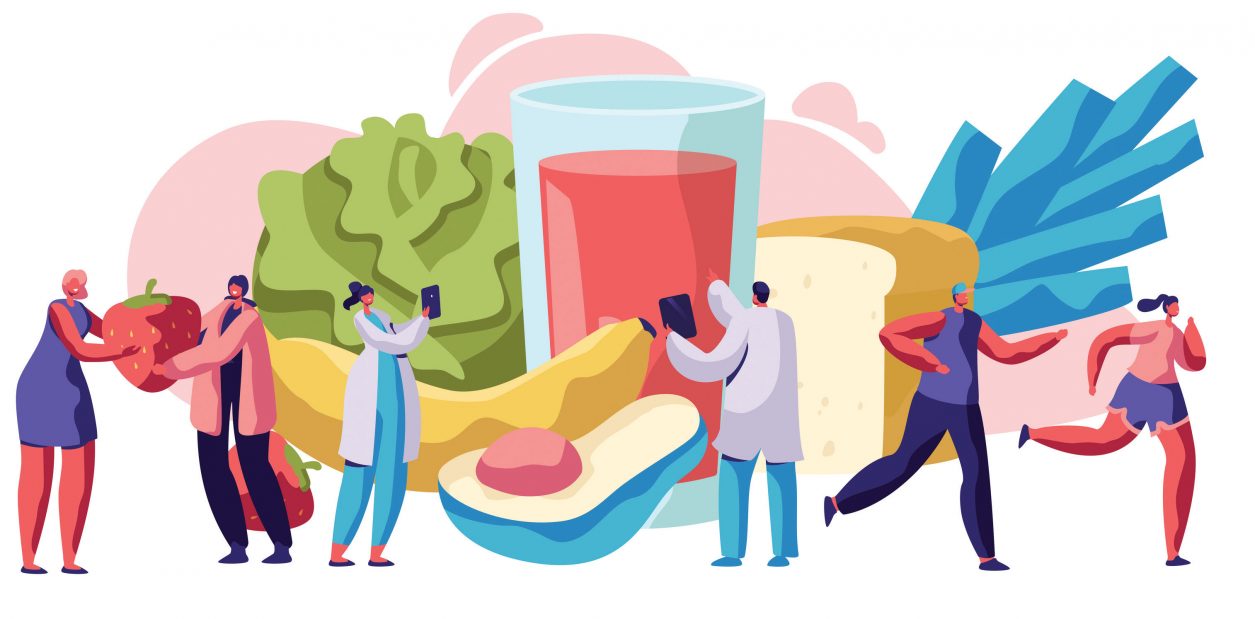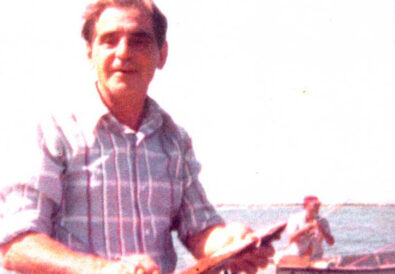
Here I sit in this stately 19th century room wondering if our political systems and societal patterns will ever catch up with the demands of our time. When this building went up in 1848, slavery was still in full force with over 3 million slaves counted in the 1850 census. Some of them may have built this very structure, I think to myself— but they never had a seat at the table.
Now Eric Adams, the former police officer and former state senator, reigns in these colonial halls, and Brooklyn loves him.
Q. Johanna Sophia
So, President Eric Adams, let’s discuss your story. You were raised in a family of 6 children, that must have given you some stamina.
A. Eric Adams
Yes! Four boys and 2 sisters and an amazing mother—her most famous quote being, “Don’t let anything not human stop you and if human let it be a tie!”
Q. There is a saying: We never lose because if we don’t win, we gain experience.
A. That is so true. And often times we focus so much on outcomes and not the journey; being Borough President and planning other things that I will be doing, it’s the journey there and the people on that journey. If I weren’t borough president, I would not know you and so many other great people. And so, yes, it’s about experience.
Q. Your father was a butcher. So there must have been meat in the house at all times. Were your friends at school envious of you?
A. Yes. Without a doubt. As we grew up in South Queens, there was the culture that your status in society was based on your ability to have meat as the center of your diet. And we defined ourselves by “Do you have meat?” If someone came to your house for dinner, lunch or even breakfast, if you did not have sausages for breakfast, if you didn’t have ham sandwiches for lunch and if you were missing that steak or chicken for dinner, it was an indicator that you were of a lower class. So, built into our entire psyche was meat.
Q. After all this, the big question is: where did you first come across the concept of a meatless diet?
A. Out of a dark place, literally dark, where I was losing my eyesight. I was one of the 7 million diabetics that went undiagnosed for years and when I learned that I was one I was already in a later stage with serious nerve damage in my hands and feet, had lost sight in my left eye and losing it in my right eye as well. I was designated to go down this dark path of medication, insulin, medication for an ulcer, high blood pressure, and all the other medicines that you need for chronic diseases. And it was in that dark place that I saw a light through medical professionals.
Q. It was actually your medical professionals who suggested that you should reduce your meat intake?
A. You’ve got to put an asterisk here because I went to my 5 doctors here in the city and they all said the same thing— there was nothing I could do because it’s hereditary. And it wasn’t until I did my own science research and I googled the words “reversing diabetes.” I was fascinated by the fact that the terminology was always “how do you live with the disease” but something inside me had me google “reversing diabetes” and that made me find the medical professionals, Dr. Barnard, Dr. Esselstein, Dr. Gregor. They were the “team” of doctors who were hidden in plain sight, and it wasn’t until I started to lose my sight that I started to see the light and that there was another way to go.
Q. Beautiful allegory. What did you think at the time was happening to your body; you just thought this is genetics?
A. Hearing the diagnosis, I remember thinking, oh you knew this was coming: all the people getting older in your neighborhood they all take the same medicine, you knew that this was part of life. It wasn’t until they said “You’re going to lose your sight and you’ll be on medicine for life” that I said, wait a minute, I did not sign up for that part. We often “sweeten” the terminology we use in communities of color where we say, “She has a little sugar.” We make it sound not as detrimental. And I said, I’m not going down this road without a fight! My mother said, don’t let anything that’s not human beat you, and I said I’m not going to let diabetes beat me. I think about my days as a police officer when New York City experienced a high level of crime and we actually had an industry around the defeatist attitude that crime was always going to be here. And we surrendered. We built entire industries around that, just like we build industries around the perception that you will always be sick.
Eric Adams: And when you look at the fact that we’re spending 80 cents of the medical dollar on chronic diseases in this country and think of the 84 million who are pre-diabetic, they are sitting on the bench waiting to get in the game of healthcare crisis. And really, our health care crisis is not sustainable. We cannot continue traveling down this road.
Johanna Sophia: Exactly. And the expenses are always increasing. When Medicare for all is suggested, we assume that we will have the same procedures, the same medications, the same endless treatments, the continued “management” of diseases that go on forever whereas Medicare for all should go conscious, natural self-healing and the healing of the planet as a concept.
Eric Adams. What you said is so important: it’s amazing that it’s all together. The fires in the Amazon, those are not natural disasters. They are based on our over-consumption of meat. So what we’re doing to mother nature, we’re doing to our bodies as well. When we start destroying the planet, we’re also destroying ourselves. And so we need to see the holistic approach of how we must live in unison with nature and live in unison with ourselves.
Q. Yes. Then how come there isn’t more hoopla about what happened in your body once you made the switch? Describe what happened the moment you said, let me try this plant based diet.
A. Right. It was amazing. I remember speaking to Dr. Esselstein and he was explaining to me about a plant based diet, and I was like: What’s wrong with this guy, I’m telling you about my eyesight and you’re telling me not to eat a hot dog? But something in me said, “Eric, just try it.” And when I returned to the city (Dr. Esselstein resides in Cleveland), I looked into my fridge and I realized for the first time, I don’t have anything healthy in here! Everything I had was processed. I looked in my pantry and everything there Interview with Brooklyn Borough President, Eric Adams was processed, I looked at my snacks on my countertop, they were all processed… I started reading the labels and I said to myself: this is what he was talking about. So I took a large garbage bag and emptied my entire refrigerator and emptied my pantry and threw out all my snacks; and three weeks later my vision cleared up from going onto a wholefoods, plantbased diet. Three months later, my nerve damage had gone away, my ulcer went away with no medicine, my blood pressure normalized, my cholesterol normalized, everything normalized. It was so fast. It was as though my body was saying, Feed me! Feed me plants, so I can work for you, instead of against you!
Q. That is so cool. I’ve said it many times: It takes 20-30 years to destroy a body to that extent, yet it takes only weeks to restore it.
A. And it’s not just the Eric Adams’ story. One might say, oh this is just what happened to you. That is not true. My mom was diabetic for 15 years, 7 years on insulin. When she switched over to a whole foods plant based diet, Mom was off of insulin in two months. And she’s 80 years old.
Q. Awesome! I love it. I gave my dad an extra year but then his second wife wouldn’t keep him on track.
A. That’s why relationships inside your household are so important. We should not only see the person as a partner because they’re physically appealing, they must be internally appealing and understand the holistic lifestyle.
Q. I want to ask you one more question: What are you doing as Borough President for schools and the next generations?
A. We are so excited that we’ve done some amazing things that many people thought would be impossible. We moved the city to stop producing processed meat to serve to our children and now have a 50% meat reduction. And eventually we want to go even further. We have Meatless Mondays in our schools and meatless Mondays in our hospitals. And we are showing young people how to grow food. We have to start to fertilize the ground and plant the seeds so we can produce the right crops for our children and their future. It’s about educating them and showing the connection between Climate Change and what we consume every day and empower them to know what kind of world they want to live in. We’re excited about the initiatives and are looking at all our city agencies and are telling them, “Look at the foods you are serving, are you feeding the crisis or are you empowering future generations?”
 Prof Johanna Sophia, International Speaker, Coach and Author, has taught at Yale and Columbia Universities among others, built schools and businesses, a food manufacturing company, Johanna’s Raw Foods PBC, and consults with organizations in matters of Self-Healing with food, new forms of Education, Sustainability, Raising Confident Kids, and Empowering Women over Fifty. JohannasRawFoods.com.
Prof Johanna Sophia, International Speaker, Coach and Author, has taught at Yale and Columbia Universities among others, built schools and businesses, a food manufacturing company, Johanna’s Raw Foods PBC, and consults with organizations in matters of Self-Healing with food, new forms of Education, Sustainability, Raising Confident Kids, and Empowering Women over Fifty. JohannasRawFoods.com.




















